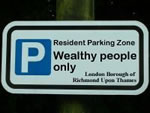 More interested in pounds than planet?
More interested in pounds than planet?Far from the bogeymen eco-extremists make them out to be, car makers are crying out for the government to provide real incentives for people to switch to their greener products.
But rather than enabling people to make an affordable, more environmentally-friendly choice, all allegedly 'green' politicians seem interested in so far is ways to increase taxes and wring more cash out of already financially hard-pressed car users.
Saab MD Jonathan Nash is the latest to appeal for the government to take action to boost the emerging bioethanol fuel industry. Speaking at the launch of Saab's second flex-fuel car – the Saab 9-5 2.3t BioPower – Nash said that CO2 emissions could be cut by as much as 70%. Yet incentives for buyers in the UK were not available.
He has joined Ford, which makes the Focus FFV, Morrisons Supermarkets and the National Farmers Union in asking for the Chancellor to include incentives in his 2007 budget.
Joining the growing chorus pointing out the government's hypocrisy, Nash said, "Upon publication of the Stern Review the British government claimed to be leading the global debate on climate change. Well I don't see much evidence of that.
"What I see is the Swedish government taking progressive measures, such as major tax relief at the pump and for company car drivers, and free parking in Swedish cities to encourage drivers into environmentally friendly cars, instead of penalising them."
Those politicians professing concern about the environment but only proposing ramping up taxes on car use to ridiculous levels can only be trying to pocket more of our pounds rather than save the planet.
A real demonstration of their professed conviction about the dangers facing the planet would be acting on the fact that a far more speedy and effective reduction in carbon emissions could be achieved if they reduced their tax take on environmentally-friendly products to make them more affordable. And not just in transport.
When they show a willingness to do this, then maybe they can expect their lectures about global warming to be taken more seriously.












